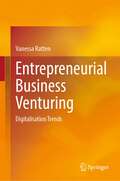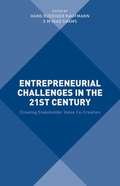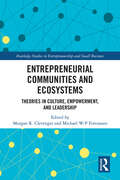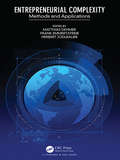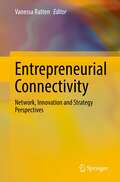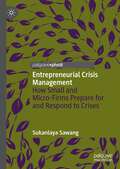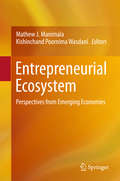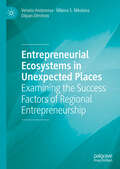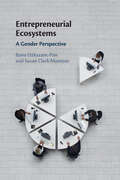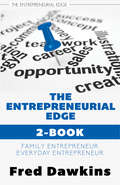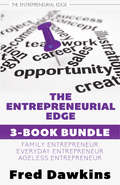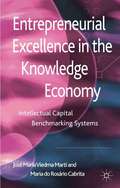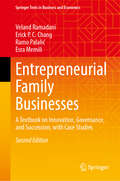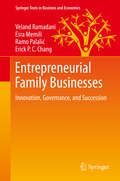- Table View
- List View
Entrepreneur: Building Your Business From Start to Success
by Lars Tvede Mads FaurholtBuild a world class business with a clear blueprint to success Entrepreneur: Building Your Business From Start to Success is your guidebook to achieving entrepreneurial success. Whether you’re an existing business owner seeking to increase your reach, or a budding entrepreneur ready to take the next step, this book provides invaluable guidance from experts who have made it happen time and time again. A simple step-by-step process will help you translate your ideas into effective business plans, raise the capital needed to start and grow your business, build a winning team and leave the competition behind. Drawing upon their experience founding more than 30 companies, the authors share their entrepreneurial wisdom and reveal the real-world techniques that lead to success. With a pragmatic and personal approach, the authors explore the personal characteristics that are vital to achievement; managing stress, withstanding heavy workloads and coping with potential health concerns are subjects often overlooked in the pursuit of business achievement. Addressing the link between business concerns and personal welfare, the authors offer suggestions on how to most effectively reconcile entrepreneurial drive with personal well-being. Build or revitalise a business with proven methods from two globally-recognized experts in the field Develop an effective business plan to maximise your probability of success Understand funding markets and raise capital necessary to start or grow your business Grow your business by beating the competition and dominating your market Providing invaluable insight into real-world entrepreneurial methods that work, this book arms current and future business leaders with the skills, knowledge and motivation to create the organization of their dreams.
Entrepreneurial Activity in Malaysia: A Country Level Perspective
by Paul Hannon Paul Jones Louisa Huxtable-Thomas Syahira Hamidon Norgainy Mohd TawilDespite being the third largest economy in Southeast Asia, Malaysian entrepreneurial activity is under-reported in the scholarly literature. This book extends such research by examining the impact of entrepreneurship on its economy and evaluating the existing systemic problems. The Malaysian economy has benefited from the density of knowledge-based businesses and utilization of the latest technologies in the manufacturing and digital economies. However, Malaysia faces ongoing challenges, namely concentration of wealth in the city, high regional unemployment and workplace gender inequality. In regional areas, there is an over-reliance on agriculture and necessity based entrepreneurship. Consequently, entrepreneurial activity has been encouraged with the creation of eco-systems, seed corn funding and provision of entrepreneurship education to offer entrepreneurial career choices. Providing recommendations and best practice for driving entrepreneurship and entrepreneurial behaviours, this contributed volume presents the first opportunity to reflect on both the success stories and systemic problems related to effective entrepreneurial behaviour in a South East Asian context.
Entrepreneurial Alertness: An Exploratory Study
by Zhineng LiEntrepreneurial alertness plays an important role in the processes of opportunity exploration and exploitation. A central thesis of this dissertation is that opportunity creation requires a certain transformation of an individual entrepreneur's mental schema. This study examines entrepreneurial alertness at the individual level. A comprehensive model of entrepreneurial alertness are created and tested via structural equation modeling on the basis of survey data from 1080 entrepreneurs in two coastal regions of P. R. China.
Entrepreneurial Attributes: Accessing Your Inner Entrepreneur for Business and Beyond (ISSN)
by Andrew Paul ClarkeEverybody wants their employer to recognise and value the skills and attributes they have, but not everybody feels those skills are valued. Entrepreneurial Attributes: Accessing Your Inner Entrepreneur for Business and Beyond looks at the link between skills, actions and attributes, and the value they present: value in terms of how an employee can be more valuable to the company they work for – in essence, more employable. The book aims to answer the question: why are entrepreneurial attributes we see in businesspeople valued, but in non-businesspeople they are sometimes not recognised when there is a clear link between entrepreneurial skills and attributes, human capital (effectively your CV) and how successfully a company performs?Entrepreneurial Attributes: Accessing Your Inner Entrepreneur for Business and Beyond discusses how we currently view skills, actions and attributes, and how those attributes add value to a person in life and to a business that person works for. The author questions whether certain skills and actions are unrecognised or neglected in today’s world, and uses case studies and research methodologies to illustrate how value can be recognised and appreciated within the context of human capital and firm performance. Finally, the book offers tools and strategies which may assist the reader in gaining a better understanding of the way in which their entrepreneurial actions and attributes can enhance their value as a person and also make them more employable. This book also offers businesses tools to better recognise and reward the skills it needs.The ideal audience for this book are those of us who wish to better evidence the skills and value we can offer a company; Entrepreneurial Attributes: Accessing Your Inner Entrepreneur for Business and Beyond will find an appreciative audience wherever there is a keen interest in the recognition and value of employee skills and attributes.
Entrepreneurial Behaviour: Individual, Contextual and Microfoundational Perspectives
by James A. Cunningham Maura McAdamThis edited collection draws together cutting edge perspectives from leading scholars on the increasingly prominent discussion of entrepreneurial behaviour. Exploring various aspects of human behaviour, the authors analyse the antecedent influences and drivers of entrepreneurial behaviour in different organisational settings. This collection is of interest to scholars, practitioners and even policy-makers, as a result of its in-depth exploration, discussion and evaluation of emerging themes of entrepreneurial behaviour within the field of entrepreneurship and beyond. Offering contextual examples from universities, firms and society, Entrepreneurial Behaviour covers topics such as entrepreneurial intention, gender, crime, effectuation and teamwork.
Entrepreneurial Business Venturing: Digitalisation Trends
by Vanessa RattenIn today's competitive marketplace, businesses must be entrepreneurial to succeed. This book argues that entrepreneurship allows businesses to adapt to changing economic conditions and societal needs. It focuses on entrepreneurial business venturing as a means of understanding how businesses innovate, take risks, and think futuristically. The text emphasizes the importance of understanding digitalization trends in these ventures to grasp digital innovation trends better. The book explores why an entrepreneurial perspective is crucial in business, explaining the role of the knowledge economy in society and the need for businesses to prioritize digital technology. It examines how the nature of work has evolved due to the COVID-19 pandemic, including the rise of flexible work arrangements and remote work, with case studies from international companies. Furthermore, the book argues that digital forms of entrepreneurship are increasingly important in responding to crises and international developments. It highlights the need for scenario and forecast planning in developing new products and services to meet evolving customer needs. The book also provides examples of business model innovation, which underscores the importance for businesses to emphasize entrepreneurship not only in product development but also in their interactions with society. It discusses how businesses can achieve this through an entrepreneurial health audit, which focuses on entrepreneurial intensity, frequency, and ideas for start-ups and spinoffs. By examining examples and suggestions included in the book, businesses can learn about the role of entrepreneurial learning and failure in creating an entrepreneurial culture.
Entrepreneurial Challenges in the 21st Century: Creating Stakeholder Value Co-creation
by S M Riad Shams Hans KaufmannEntrepreneurial Challenges in the 21st Century analyses the traditional and contemporary issues of entrepreneurial innovation potentials for stakeholder value co-creation, and structures the entrepreneurial co-creation concept to reinforce co-creation.
Entrepreneurial Cognition
by Dean A. Shepherd Holger PatzeltLearning from Entrepreneurial Failure provides an important counterweight to the multitude of books that focus on entrepreneurial success. Failure is by far the most common scenario for new ventures and a critical part of the entrepreneurial process is learning from failure and having the motivation to try again. This book examines the various obstacles to learning from failure and explores how they can be overcome. A range of topics are discussed that include why some people have a more negative emotional reaction to failure than others and how these negative emotions can be managed; why some people delay the decision to terminate a poorly performing entrepreneurial venture; anti-failure biases and stigmatism in organizations and society; and the role that the emotional content of narratives plays in the sense-making process. This thought-provoking book will appeal to academic researchers, graduate students and professionals in the fields of entrepreneurship and industrial psychology.
Entrepreneurial Communities and Ecosystems: Theories in Culture, Empowerment, and Leadership (Routledge Studies in Entrepreneurship and Small Business)
by Morgan R. Clevenger Michael W-P FortunatoEntrepreneurial Communities and Ecosystems: Theories in Culture, Empowerment, and Leadership examines the deep sociocultural dynamics supporting effective and emergent entrepreneurial ecosystems and communities for a new generation of ecosystem builders and researchers. The book provides current theories and discussion with relevant examples regarding culture, empowerment, and leadership in entrepreneurship to build more entrepreneurial communities anywhere, beginning with any set of local advantages. It clarifies the role of community in building an entrepreneurial ecosystem, and expands the theory on how entrepreneurial communities and ecosystems differ, and how they relate. The book also illuminates the often avoided discussion about power with special attention to diversity with examples of black, women, and LGBTQA+ entrepreneurship; provides a deep dive into the range of formal and informal education framed as entreprenology; ties the importance of entrepreneurship and entrepreneuring to resources available at the community, state, and national levels; and introduces a new concept — omnipreneurship — which puts the skills of entrepreneurship in the service of global benefit and everyday action. This research volume will be equally useful as an undergraduate or graduate text on the sociology of entrepreneurs and entrepreneurship as it is a field guide for ecosystem builders, policy makers, nonprofits, and entrepreneurship and social researchers worldwide.
Entrepreneurial Complexity: Methods and Applications
by Matthias Dehmer Frank Emmert-Streib Herbert JodlbauerEntrepreneurial Complexity: Methods and Applications deals with theoretical and practical results of Entrepreneurial Sciences and Management (ESM), emphasising qualitative and quantitative methods. ESM has been a modern and exciting research field in which methods from various disciplines have been applied. However, the existing body of literature lacks the proper use of mathematical and formal models; individuals who perform research in this broad interdisciplinary area have been trained differently. In particular, they are not used to solving business-oriented problems mathematically. This book utilises formal techniques in ESM as an advantage for developing theories and models which are falsifiable. Features Discusses methods for defining and measuring complexity in entrepreneurial sciences Summarises new technologies and innovation-based techniques in entrepreneurial sciences Outlines new formal methods and complexity-models for entrepreneurship To date no book has been dedicated exclusively to use formal models in Entrepreneurial Sciences and Management
Entrepreneurial Connectivity: Network, Innovation and Strategy Perspectives
by Vanessa RattenThis book explores how entrepreneurial networks provide the basis for individuals and firms to compete based on knowledge asymmetries. This book states that this is crucial in the increasingly interdependent world where social capital influences potential market performance. This edited book focuses on future trends regarding entrepreneurial networks in terms of social, cultural and market connections thereby bridging the entrepreneurship, strategy and network literature. This book provides a practical way to capture market changes as networks evolve to a more digital format. The impact of innovation and strategy on these market developments will be discussed in each chapter as a way to understand performance.
Entrepreneurial Cosplay: Creating Identity, Building Identity, Brand and Business Acumen (Routledge Studies in Media and Cultural Industries)
by Elizabeth Gackstetter Nichols Amy C. Lewis Dave TomczykEntrepreneurial Cosplay takes a comprehensive and insightful look at the business of cosplay, exploring the ways that artists and fans engage in entrepreneurial and intrapreneurial practices to gain personal and professional success. Centered around the concept of entrepreneurship and the newly emerging concept of intrapreneurship – using entrepreneurial principles to enhance or further an existing concept, organization or product – the book showcases the ways in which cosplayers create new ideas, new ways of working and new ways of doing things, exploiting their knowledge to create new opportunities. By analyzing the numerous motivations driving cosplay behavior (self-expression, external recognition and financial gain), this volume provides a unique view of current cosplay practice and its relationship to economic activity. Offering important insight into this emerging area, this book will be of interest to scholars seeking to learn how entrepreneurial and economic models may be used to understand the emerging field of cosplay studies, as well as students and scholars working in the fields of Entrepreneurship, Business, Fan Studies, Visual Art Studies and Gender Studies.
Entrepreneurial Crisis Management: How Small and Micro-Firms Prepare for and Respond to Crises
by Sukanlaya SawangThis book explores the timely issue of how small businesses, micro firms and entrepreneurs respond to crises. A largely overlooked area of research, the author posits that by better understanding crisis management in small and micro firms, we can help to protect these businesses from the potentially devastating effects of a crisis.Offering guidance for scholars and practitioners, including small business owners, to better understand the concept, limitations and considerations of crisis management - specifically in the small business context - the author demonstrates that there is no single solution for a small business to cope with a crisis. Drawing from the thematic findings, the author offers valuable recommendations on how small business owners can strategically plan for the future and better manage their capability when faced with a crisis.
Entrepreneurial Ecosystem
by Mathew J. Manimala Kishinchand Poornima WasdaniEconomic development is a priority for all nation-states, whether developing or developed. In recent times, a few among the developing nations - often referred to as the emerging economies - have attracted the world's attention because of their fast pace of economic growth. While the similarities among these nations (for example the BRICS) in the pattern of their economic growth are highlighted and discussed, the differences are often glossed over. This book, therefore, attempts to present the diverse ways in which entrepreneurship is facilitated in emerging economies, through a compilation of research papers from six different countries (India, China, Singapore, Hong Kong, Nigeria and New Zealand) belonging to the class of emerging economies. The papers included in this book cover a variety of topics related to the creation and management of an entrepreneurial ecosystem, such as intercultural interactions, IPR issues, government policies for SMEs, social entrepreneurship, opportunity identification, green entrepreneurship, employee entrepreneurship, symbiotic ventures and social capital, social fluidity mapping for reducing failure stigma, green awareness in the corporate world and among entrepreneurs, venture capital for growth, immigrant entrepreneurs, entrepreneurial success and life satisfaction, among others. The contributions are supported by an introductory chapter that provides an integrative framework by unifying the diverse patterns of economic development in the different countries under various institutional inadequacies as a process of "muddling-through to development", necessitated by the non-systematic development of the ecosystem for new venture creation. This book is indeed a must-read for those interested in understanding the process of entrepreneurship and economic development in emerging economies.
Entrepreneurial Ecosystems
by David B. Audretsch Allan O'Connor Erik Stam Fiona SussanThis book brings together leading research and scholarship on one of the newest and most compelling forces of economic growth, dynamism and innovation - entrepreneurial ecosystems. Particular emphasis is given to the role of innovation, startups, SMEs and technology transfer in shaping the entrepreneurial ecosystem, as well as its impact on firm performance and regional economic performance. From the perspectives of theory, empirical analysis and public policy, this book shows why entrepreneurial ecosystems have become the new economic superstars in the global economy. It provides explicit analysis of policies promoting entrepreneurship and entrepreneurial ecosystems, and examines the link between entrepreneurial ecosystems and universities. This timely collection of research will be of interest not only to academics and scholars in economics and management, but also to thought leaders in public policy and business.
Entrepreneurial Ecosystems in Unexpected Places: Examining the Success Factors of Regional Entrepreneurship
by Veneta Andonova Milena S. Nikolova Dilyan DimitrovThis book sheds light on one of the biggest development issues of our time: how the rise of entrepreneurship and the associated mindset is likely to unfold in unexpected places and change socio-economic and political fortunes. Focusing on the Balkan Peninsula, the authors explore the early success of young entrepreneurial ecosystems in the region and highlight the dangers of direct comparison with more mature entrepreneurial centres. Offering fresh insights, this brand new book presents an analytical overview of the entrepreneurial domain that enabled Bulgaria to become the start-up capital of the Balkans. With empirical data gathered from over 80 interviews and case studies, the authors address the needs of decision-makers and managers in many countries which are on the path towards nurturing entrepreneurial ecosystems.
Entrepreneurial Ecosystems: A Gender Perspective
by Banu Ozkazanc-Pan Susan Clark MunteanBased on extensive fieldwork, this book demonstrates how gender is an organizing principle of entrepreneurial ecosystems and makes a difference in how ecosystem resources are assembled and how they can be accessed. By bringing visibility to how ecosystem actors are heterogeneous across identities, interactions and experiences, the book highlights the role and complexity of individual, organizational, and institutional factors working in concert to create and maintain gendered inequities. Entrepreneuria Ecosystems provides research-driven insights around effective organizational practices and policies aimed at remedying gendered and intersectional inequalities associated with entrepreneurship activities and economic growth. Proposing a typology of four ecosystem identities, it highlights how some might be more amenable and organized towards gender inclusion and change, while others may be much more difficult to change, reorganize and restructure. It offers scholars, students, practitioners and policymakers insights about gender in relation to analyzing entrepreneurial ecosystems and for fostering inclusive economic development policies.
Entrepreneurial Edge 2-Book Bundle: Everyday Entrepreneur / Family Entrepreneur
by Fred DawkinsThis special 2-book bundle contains invaluable business advice for the budding entrepreneur from one of the best. In Everyday Entrepreneur, you will meet three individuals who all have entrepreneurial aspirations. The first is Tim, whose career is stagnating, despite having a good job. Tim has developed some software that could form the basis of his own business, but he can’t make the decision whether or not to set up on his own. Terry, a childhood friend, steers Tim into a class on entrepreneurship conducted by a mysterious person named Sam. The class includes two others: Grace, in her mid-thirties, and Mike, who is twenty-something. Sam invites his three students to learn to become entrepreneurs over a period of twelve days. By focusing on the qualities of a successful entrepreneur and by relying on a wide range of anecdotes, he cleverly leads all three to make important decisions about their future. In Family Entrepreneur, frustrated individuals, immersed in family businesses, enroll in a two-week course on entrepreneurship that will change their lives. For ten years Mary has been an office manager at her brother’s business and seen her younger brother join the company and receive share while she gets none. Plagued by doubts about her ability to change the culture in the family business or succeed outside it, Mary hears about a seminar series on family entrepreneurship and signs up. A crusty mentor named Sam conducts the seminars in a class that includes three others: a son considering taking over a family business, the owner of a successful company involving her two daughters, and a man with a stormy working relationship with his sister. Includes Everyday Entrepreneur Family Entrepreneur
Entrepreneurial Edge 3-Book Bundle: Everyday Entrepreneur / Family Entrepreneur / Ageless Entrepreneur
by Fred DawkinsA three-book bundle of essential advice for budding entrepreneurs, coming from one of the best in business. Includes: Everyday Entrepreneur – #1 Tim, whose career is stagnating despite his having a good job, has developed some software that could be the basis of his own successful business, but he can’t decide whether to set up on his own, which is how he ends up in a class on entrepreneurship conducted by a man named Sam. By focusing on the qualities of a successful entrepreneur and by learning from Sam’s wide-ranging experience, Tim and his fellow students learn to make important decisions about their future. Family Entrepreneur – #2 Sam returns as frustrated individuals immersed in family businesses enroll in his entrepreneurship course. For ten years Mary has worked at her brother’s business, and has seen her younger brother join the company and receive shares while she got none. Driven by doubts about her ability to change the culture of the business or succeed outside it, Mary signs up with Sam. Her class includes three others: a son considering taking over a family business, a successful business owner employing her two daughters, and a man with a stormy working relationship with his sister. Ageless Entrepreneur – #3 This book explores the economic, social, and technological forces that are pushing people into business for themselves at earlier and later stages in their lives than in the past. Whatever their reasons — doors opened by new technology, the self-reliance of owning a robust business — students gather once more to learn how to succeed at any age.
Entrepreneurial Essence in Family Businesses: Continuity in Family Capitalism (International Series in Advanced Management Studies)
by Bernardo BertoldiThis monograph seeks to identify the mechanism that successfully guides the continuity of the family business through generations. Different perspectives have been used through years: from the identification of the entrepreneurial characteristics to the succession model implemented, and to the educational path for the next generations of entrepreneurs. In this context, the book focuses the attention on the link between different generations of entrepreneurs. In particular, it presents and analyzes the evolutive circle of the family business among generations. This approach permits a holistic view of the intergenerational entrepreneurship within the entrepreneurial families and their businesses. Once intergenerational entrepreneurship has been deeply described, two areas in which the next generation must excel are analyzed: the adaptation to the evolution of the external environment, and the leadership attitude. The author's central message is that evolution happens when the entrepreneurial processes are absorbed by the next generation through the learning of heuristics. Having a leadership style is more than setting a vision, which has to do with strategy and taking important decisions.
Entrepreneurial Excellence in the Knowledge Economy
by José Maria Viedma Marti Maria do Rosário CabritaIn the context of deep uncertainty and turmoil the only source of wealth is what individuals, organizations and nations are able to create with what they know. Well-formulated and implemented strategies have always been the foundation of business excellence the only source of wealth in any economy. <P><P>The authors of this volume provide readers with a comprehensive overview of how to achieve entrepreneurial excellence in the knowledge economy and offer them the Intellectual Capital Benchmarking System (ICBS): a methodology for a strategy check-up of organizations in the knowledge economy context. <P><P>Among different intellectual capital methodologies and tools, ICBS is the only one relevant for successful strategy formulation, successful innovation, and for gaining and sustaining competitive advantages. "
Entrepreneurial Families: Business, Marriage and Life in the Early Nineteenth Century (Studies in Business History #3)
by Andrew PoppEntrepreneurship is increasingly being recognized as an important facet of economic history. Popp examines the Shaw family business to present a study of entrepreneurism that puts the family centre stage.
Entrepreneurial Family Businesses: A Textbook on Innovation, Governance, and Succession, with Case Studies (Springer Texts in Business and Economics)
by Veland Ramadani Ramo Palalić Esra Memili Erick P. ChangThis book provides an extensive overview of family business-related topics such as context and uniqueness, lifecycle and ownership configurations, conflict management, corporate governance, succession challenges, internationalization, innovation, and socioemotional wealth. Each chapter features clear learning objectives, key concepts and terminology, and dedicated case studies to demonstrate the main messages. The book not only considers the day-to-day dynamics in family businesses but also places substantial emphasis on the entrepreneurial skills needed for these businesses to survive and thrive, today and tomorrow. In addition, it elaborates and discusses a number of best practice examples, which offer valuable guidance not only for scholars but also for students who wish to study these challenges. This new edition includes new topics, such as open innovation, sustainable and green family entrepreneurship, digital aspects in the family business, estate planning, and strategic HR. Specially curated case studies, and additional tasks and activities for classrooms will be particularly useful for MBA students and lecturers.
Entrepreneurial Family Businesses: Innovation, Governance, and Succession (Springer Texts in Business and Economics)
by Veland Ramadani Ramo Palalić Esra Memili Erick P.C. ChangThis book provides an extensive overview of family business-related topics such as context and uniqueness, lifecycle and ownership configurations, conflict management, corporate governance, succession challenges, internationalization, innovation, and socioemotional wealth. Each chapter features clear learning objectives, key concepts and terminology, and dedicated case studies to demonstrate the main messages. The book not only considers the day-to-day dynamics in family businesses, but also places substantial emphasis on the entrepreneurial skills needed for these businesses to survive and thrive, today and tomorrow. In addition, it elaborates and discusses a number of best practice examples, which offer valuable guidance not only for scholars, but also for students who wish to study these challenges.
Entrepreneurial Finance
by J. Chris Leach; Ronald W. MelicherMaster each step of the complete ""life cycle"" of a firm with Leach/Melicher's ENTREPRENEURIAL FINANCE, 7E. <p><p>This edition vividly explains the theories, corporate finance tools and techniques you need to start, build and eventually harvest a successful entrepreneurial venture today. Using an inviting presentation, this book emphasizes sound financial management practices as you learn how to secure financing, use business cash flow models and strategically position your early-stage company. You also learn how to interact effectively with financial institutions and regulatory agencies that can impact venture growth and ensure liquidity for investors. <p><p>Updates throughout this edition feature real examples as well as in-depth capstone cases and mini-cases drawn from actual entrepreneurial ventures and common financial scenarios. Strengthen your entrepreneurial skills as you study key concepts, such as venture capital funds, clean tech, sustainable sales growth, strategic alliances, licensing agreements and exit strategies.





